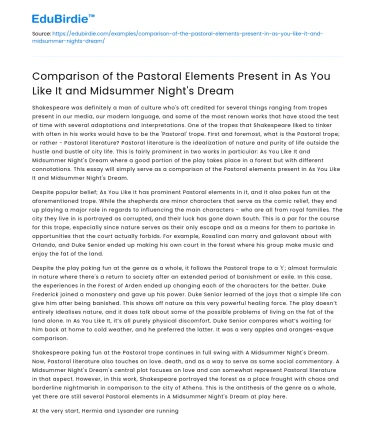Shakespeare was definitely a man of culture who's oft credited for several things ranging from tropes present in our media, our modern language, and some of the most renown works that have stood the test of time with several adaptations and interpretations. One of the tropes that Shakespeare liked to tinker with often in his works would have to be the 'Pastoral' trope. First and foremost, what is the Pastoral trope; or rather - Pastoral literature? Pastoral literature is the idealization of nature and purity of life outside the hustle and bustle of city life. This is fairly prominent in two works in particular: As You Like It and Midsummer Night's Dream where a good portion of the play takes place in a forest but with different connotations. This essay will simply serve as a comparison of the Pastoral elements present in As You Like It and Midsummer Night's Dream.
Despite popular belief; As You Like It has prominent Pastoral elements in it, and it also pokes fun at the aforementioned trope. While the shepherds are minor characters that serve as the comic relief, they end up playing a major role in regards to influencing the main characters - who are all from royal families. The city they live in is portrayed as corrupted, and their luck has gone down South. This is a par for the course for this trope, especially since nature serves as their only escape and as a means for them to partake in opportunities that the court actually forbids. For example, Rosalind can marry and galavant about with Orlando, and Duke Senior ended up making his own court in the forest where his group make music and enjoy the fat of the land.
Save your time!
We can take care of your essay
- Proper editing and formatting
- Free revision, title page, and bibliography
- Flexible prices and money-back guarantee
Despite the play poking fun at the genre as a whole, it follows the Pastoral trope to a 't'; almost formulaic in nature where there's a return to society after an extended period of banishment or exile. In this case, the experiences in the Forest of Arden ended up changing each of the characters for the better. Duke Frederick joined a monastery and gave up his power. Duke Senior learned of the joys that a simple life can give him after being banished. This shows off nature as this very powerful healing force. The play doesn’t entirely idealises nature, and it does talk about some of the possible problems of living on the fat of the land alone. In As You Like It, it’s all purely physical discomfort. Duke Senior compares what’s waiting for him back at home to cold weather, and he preferred the latter. It was a very apples and oranges-esque comparison.
Shakespeare poking fun at the Pastoral trope continues in full swing with A Midsummer Night's Dream. Now, Pastoral literature also touches on love. death, and as a way to serve as some social commentary. A Midsummer Night's Dream's central plot focuses on love and can somewhat represent Pastoral literature in that aspect. However, in this work, Shakespeare portrayed the forest as a place fraught with chaos and borderline nightmarish in comparison to the city of Athens. This is the antithesis of the genre as a whole, yet there are still several Pastoral elements in A Midsummer Night's Dream at play here.
At the very start, Hermia and Lysander are running into the woods as an attempt to escape the injustices of the city. Hermia is forced by her father to marry Demetrius or else there would be punishment, either she's going to die or be sent to a nunnery, and it follows the law of Athens which is dubbed the 'ancient privilege of Athens' (MND I.i.42). Since Duke Thesus is a representation of the court, this escape into the woods resembles traditional Pastoral literature; akin to escaping the country due to harsh laws.
From here on out, however, this is where Shakespeare heavily deviates from Pastoral literature. Puck mistook Lysander for Demetrius and made the former fall in love with Helena and out of love for Hermia. The play becomes more and more complicated and convoluted as more people become involved. Like Oberon attempting to amend this mistake by making Demtrius fall in love with Helena. This is Hell on Earth for Hermia because now the love of her life is smitten with another. It becomes even worse for Hermia because prior to all of this, no man loved her, and she believes that this was all some cruel joke. She also believed that one of her best friend is in on it as well, based off her comment, 'Lo, she is one of this confederacy!' (MND, III.ii.195).
Everything is resolved once Puck and Oberon make everything right in the forest, and then Theseus states that both of the couples should wed. In the end, the two couples didn't end up returning to the woods, but they end up going back to the city. It shows the reader that the city can also be rational and peaceful once the unfair laws were done away with.






 Stuck on your essay?
Stuck on your essay?

